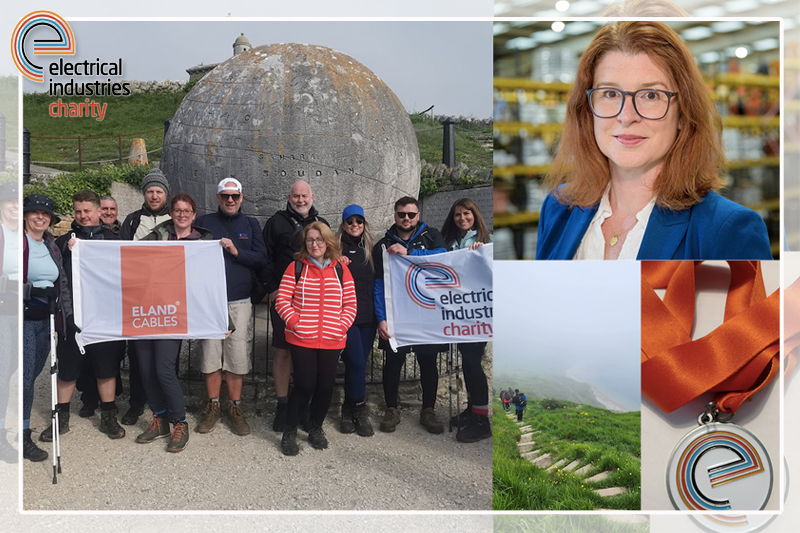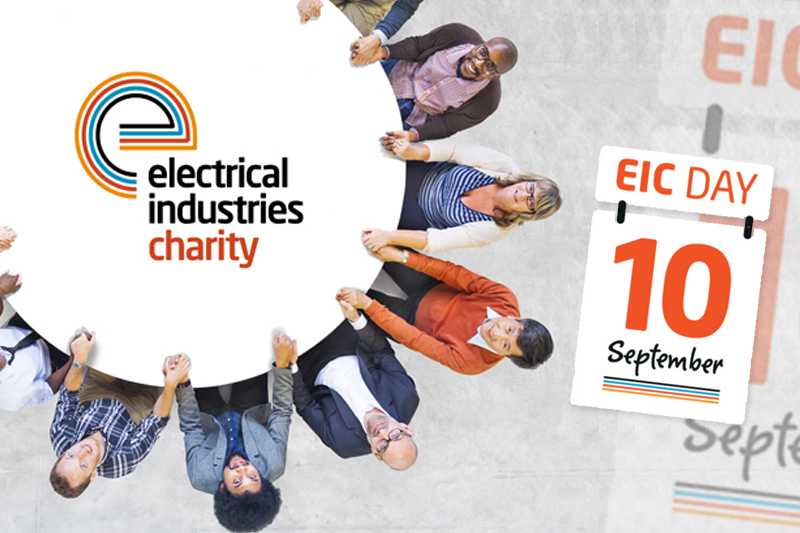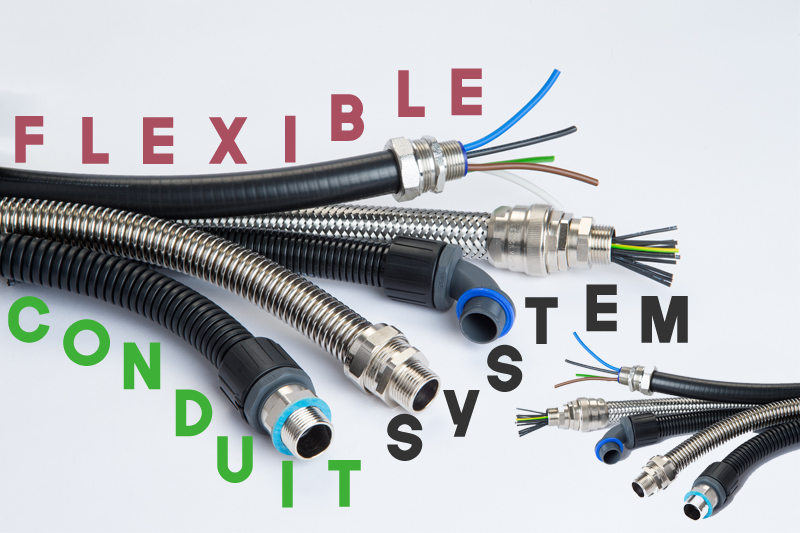As an inaugural member of the EIC’s Emerging Professionals Board, Deborah Graham-Wilson of Eland Cables reflects on her five-year tenure, the lessons learnt and what will shape the next hundred years across the breadth of the industry.
Explain why your career path was best suited to have stood and served on the Emerging Professionals Board?
When the Electrical Industries Charity Emerging Professionals Board was created back in 2017, it was my CEO who pushed me to put myself forward. I’m not sure I would have applied otherwise – a combination of the time commitment, an already heavy workload, and a sense of not being ‘good enough’ would have stopped me. I always thought Board members were those winding down their careers (no offence intended!!).
The EP Board was to be comprised of 8-10 people who had less than 10 years of experience in the industry but were seen as rising stars within their organisation. It meant that the very fact I was new to the electrical industry (having started with Eland Cables in 2015) was one of the principal reasons I was chosen. The EP Board was about having a different perspective not yet entirely shaped by time in the industry which meant most members were in their mid-to-late 20s (although I was nearly 40 at the time).
Unlike a number of my fellow EP board members, I was new to the industry but not new to the world of work. I’d joined Eland Cables in 2015 as Marketing Manager but I’d had a varied career to date – a bar in Tokyo, the trading floor of a bank in London, a mobile marketing software company in Gibraltar… and that eclectic mix of environments was, for once, a benefit in casting a different viewpoint.
The Emerging Professionals Board is there to assist the Board of Trustees and the CEO in reviewing plans for the year ahead and help this established charity stay relevant to people coming into the industry. We can be a sounding board for ideas, and also help spread the word through our own networks, championing the work of the charity at a more grassroots level than perhaps the senior board members are able to do. My ‘past life’ was an asset as I had experience of similar events or challenges that I could use as a benchmark.
What are current issues facing the industry, which go on to create life challenges for workers?
The challenges facing the electrical industry are in some ways simply reflective of current life – a cost of living crisis, 1-in-2 people experiencing cancer (or other serious medical conditions) – but also unique in many ways. There’s a high rate of suicide and divorce in the industry; you have the major employers but you also have many small businesses where an owner/operator might be struggling to keep paying staff as costs rise; apprentices finding it hard to stay in the industry as living costs spiral; and in a predominantly male industry, there’s historically been a reluctance to talk about mental health issues.
Add to that, it’s not known for being cutting-edge with digital technology which means getting the message out to those who need to hear it can be difficult. Signposting where people can get help is an ongoing challenge – fundraising to support that help is even more difficult.
During your tenure, what advances and ideas were you part of that you’ve seen have made a difference to people working in the industry?
During my time on the EP Board there’s been a positive shift towards greater inclusivity. The focus on mental health has come to the fore – an area that everyone can benefit from. A greater breadth of events also gives more opportunity for people of all levels to get involved – after all, gala black tie dinners are lovely but costly and tend to only be attended by the senior team rather than those coming up through the ranks.
The challenge is to balance what’s always been done (appealing to an engaged but perhaps ageing audience and therefore bringing in a reliable but potentially dwindling source of revenue) with exploring new opportunities that have the potential to reach more people but need thought as to the fundraising model. It’s something the charity continues to try to manage.
What are your frustrations with affecting change in the industry?
Work with a charity compared to my day job with Eland Cables is chalk and cheese. At Eland, it’s fast-paced, both reactive and proactive, with any initiatives being quickly evaluated and put into effect as appropriate. It’s a nippy speedboat compared to the tanker that is working in the charity sector. That’s to be expected, if a little frustrating. Quarterly EP Board meetings followed by the main Board of Trustees meeting means the pace of change is necessarily slower, plus generally events are planned a year in advance. There’s more need for consensus and less opportunity to directly ‘do’ as a Board member rather than an employee. As someone who relishes just getting on with it, it remains something I have struggled to adapt to.
The charity is also trying to engage with and speak to a broad audience. It means social engagement can be a challenge – so many messages across so many themes. When much of the work that goes on is handled on a strictly confidential basis, it can be tough to make it emotive and real to people in a 60-character tweet!
That said, it’s understandable when you’re trying to reach out to people in crisis – you need to be assured that as a Charity, there will be the funding and provisions to aid them. There isn’t the same option as in business to be agile – iterate, test, and potentially fail fast… but I have faith that these ideas and changes will come to fruition in time.
What’s changed post Covid?
The post-Covid world has definitely changed – the themes have changed – the potential feelings of isolation working from home, the awareness of health and wellbeing, and an increased sense of community. Yet I think at the same time many businesses have recognised this, embrace those responsibilities, and have gone further to support their staff – I know we have.
And maybe that has, in part, created a shift in the target audience of the charity too. If more corporates are providing these enhanced ESG provisions, does it mean that the EIC is focused on the SMEs and sole traders where there aren’t necessarily the funds to do this? Or are the issues that corporate employees reach out to the charity for just that much more complex as they feel it’s beyond the scope of their companies (or just ‘too much’ to approach a boss with)?
ESG is the buzz term every business is keen to embrace, what do think will get individual workers engaged and interested in it, in a meaningful way?
ESG is definitely the buzz term of choice for many corporates across the wider electrical industry. Environmental sustainability and ethical corporate governance are a must, but it’s often the ‘Social’ element that has individual workers engaged. And post-Covid that’s been one of the things I’ve seen change internally – people are more focused on their local community and charities such as the Trussell Trust and their foodbanks than perhaps on an industry-specific charity.
Covid helped locate people within a community – you got to know your neighbours, and in turn, you got to learn about their struggles as well as your own. We’ve been encouraged by colleagues to support local initiatives because they’ve got friends and family who directly use them – it makes raising awareness of the EIC and the services available that much more of a challenge. With only a finite amount of funds for charitable activities (no matter how large that may be), it’s a tougher sell than the feel-good factor of supporting hyper-local.
Don’t get me wrong – the work the EIC does is invaluable, but you only really think about it if you need to use the services yourself. The undoubted need for confidentiality works against that groundswell of good feeling.
Why are you stepping down after five years?
So why step down now? Have I achieved all I hoped for when I set out on this EP Board journey – no, but maybe those aims were unrealistic. I’ve seen the inner workings of how a charity operates and what’s been achieved has happened as fast as feasible.
The simple answer is that the EP Board is a group of people that needs churn. I’ve ‘emerged’ as much as I think I ever will (I obviously hope to continue my rise through Eland Cables). My role at work has also changed over the years – I’m in a position to enact change internally and feel I can be more effective focused on this than spreading myself thinner. I’ve gained an understanding of what the charity sets out to do, and how that can work to support my colleagues. The profile of the charity internally has been raised and I’m told that people are using the services where needed.
Giving space for new ‘rising stars’ to join the EP Board with fresh ideas and their finger on the pulse is hugely important. Being part of the EP Board gave me the confidence that I had a place in the industry (over and above a place in my company) – as part of that confidence it’s time to step aside and let someone else take on the mantle.
What’s your biggest wish for how individuals should think of the EIC and work with it best?
The role of the charity is to provide support when it feels like no one else can. My wish going forward is that those who need it most remember that the charity is there for them; and that the charity can adapt to support the challenges the industry faces now and in the future. Given they can never share details of the individual cases they support, they need to engage corporate donors by giving their support visibility – if they can’t tell the company who it’s helped on their behalf, then needs to add to a wider ESG message to industry and customers alike. Whilst I can no longer have influence in how that’s delivered, what I can do is continue to ensure the EIC remains visible to my colleagues.
For more information, click here





